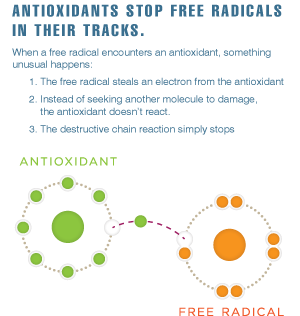Free Radical Fact Sheet
 Free Radicals – A Fact of Life
Free Radicals – A Fact of Life
Wherever there’s life, there are free radicals. You can think of free radicals as exhaust from a combustion engine. If the engine is running, it’s throwing off exhaust. The same principle applies in the human body. As you breathe, as you digest food, as you exercise, you’re producing free radicals. By simply living, you’re generating them every second of your life.
But free radicals aren’t just byproducts of your metabolism. You can encounter even more through environmental factors such as cigarette smoke, fatty foods, sunlight, and pollution. When too many free radicals are created too quickly, the real danger of free radicals becomes evident.
Minor Radicals Do Major Damage
That overbalance of free radicals, called oxidative stress, has been linked to more than 200 health problems—from cardiovascular disease to Alzheimer’s disease to wrinkles on the skin. It’s even part of how and why we age.
There are trillions of cells in your body, and every second of every day, each cell of your body has to fend off about 35,000 free radicals. Left unchecked, that free radical damage can add up fast.
Want to Stop Free Radicals? Get Antioxidants
 It might seem like free radicals are unstoppable. But there is a way to keep them in check: antioxidants. Antioxidants are the free radical police in your body. They naturally neutralize free radicals and stop the oxidation process before it can damage your cells.
It might seem like free radicals are unstoppable. But there is a way to keep them in check: antioxidants. Antioxidants are the free radical police in your body. They naturally neutralize free radicals and stop the oxidation process before it can damage your cells.
So Where Do You Find Antioxidants?
Your body naturally produces antioxidants to protect itself. And antioxidants can be found in many different foods. They’re in the fruits and vegetables you eat every day. Some of the most important nutrients, vitamins C, A, and E, are powerful antioxidants as well.
Scientists agree that getting enough antioxidants is crucial for maintaining good health and slowing the effects of the aging process. But boosting your intake of just one type of antioxidant won’t do. You need the right combination of fat-soluble antioxidants (such as tocopherols, mixed carotenoids, and lycopene) and water-soluble antioxidants (such as vitamin C), as well as phenolic compounds (such as olive extract and grape seed extract).
Do You Get Enough of the Good Stuff?
Eating a wide enough variety of antioxidant-rich foods for proper, comprehensive antioxidant protection isn’t always easy. Fresh fruits and vegetables aren’t always available. Sometimes the quantities you would have to eat to get the antioxidant support you need are prohibitive. And the fact is, due to modern farming practices, our produce just doesn’t deliver the same amounts of nutrients that it did just 50 years ago.
That’s why doctors recommend supplementing a healthy diet with optimal antioxidant support. The right supplements, delivered in a way your body can use and absorb, can fill in the antioxidant protection your diet lacks—giving you the right antioxidants in the right amounts for optimal support of your eyes, skin, heart, and every other vital system in your body.

I love this site. It gives us great info.
If people would only understand this!!
You Guys are one of my favorite sites!! Thank you! ^_^
I love the science and research behind free radicals and the damage they can cause our bodies at the cellular level if left unprotected with antioxidants. I am a huge advocate of health and wellness and especially preventative medicine. This blog is at the top of my list to read so thank you for the valuable content.
Wowza, problem solved like it never happened.
[…] situation seems to be completely out of our control, stress can turn on us—tearing us apart from the inside out. The loss of your spouse, being blocked from advancement at work, chronic health problems—all of […]